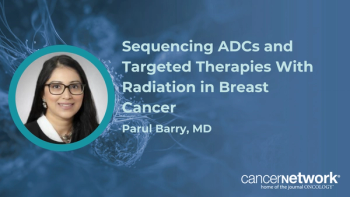
Trastuzumab Does Not Benefit HER2-Low Breast Cancer Patients
Adding trastuzumab to adjuvant chemotherapy did not result in improved rates of invasive disease-free survival in patients with early-stage breast cancer and low levels of HER2 expression, according to a new study.
Adding trastuzumab to adjuvant chemotherapy did not result in improved rates of invasive disease-free survival (iDFS) in patients with early-stage breast cancer and low levels of HER2 expression, according to a new study.
“About 15% of breast cancers are HER2-positive, but another 45% have low levels of HER2, and these patients are not currently treated with adjuvant trastuzumab,” said Louis Fehrenbacher, MD, of the Kaiser Permanente Vallejo Medical Center in California, according to a press release. Data from early trastuzumab trials showed that those HER2-low patients derived similar benefit from the agent as HER2-positive patients, so the researchers conducted a large randomized trial to test this possibility. Fehrenbacher presented results of the NASBP-B-47 trial at the 2017 San Antonio Breast Cancer Symposium (SABCS), held December 5-9.
The trial included 3,270 patients with early-stage breast cancer. All patients were HER2-low, defined as immunohistochemistry (IHC) 1+ or 2+ (IHC 3+ is considered HER2-positive) or fluorescence in situ hybridization (FISH)-positive (increased copy number of the HER2 gene). Patients were randomized to receive standard adjuvant chemotherapy with or without a year of trastuzumab.
The study had a median follow-up of 46.1 months, during which time 264 patients had a recurrence, diagnosis of a new breast cancer, diagnosis of a new cancer outside the breast, or died. The 5-year iDFS rate was 89.6% with trastuzumab, and 89.2% without it, for a hazard ratio (HR) of 0.98 (95% CI, 0.77–1.26; P = .90).
There were also no benefits when patients were divided according to various stratification variables. IHC 1+ patients had an HR of 0.88 (95% CI, 0.63–1.22), while IHC 2+ patients had an HR of 1.14 (95% CI, 0.79–1.65). There was also no benefit seen based on the number of positive nodes or hormone-receptor status.
“The retrospective outcome differences between local tested HER2-positive and central tested HER2-low patients identified in two major adjuvant trials are not readily explained,” Fehrenbacher said, referring to the earlier results showing the opposite of this new finding. “There is no benefit with trastuzumab therapy in patients with FISH ratios < 2.0 and IHC staining intensity of 1+ or 2+.”
Virginia G. Kaklamani, MD, of UT Health San Antonio and a co-director of SABCS 2017, said that these results are extremely important. “There are many patients that are 1+ or 2+, and we’ve been wondering if we should give them a very expensive drug that has its own toxicities for a whole year,” she said.
Newsletter
Stay up to date on recent advances in the multidisciplinary approach to cancer.





































